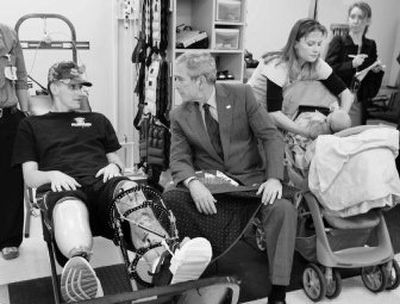President visits Walter Reed

WASHINGTON – President Bush inspected the much-maligned Walter Reed Army Medical Center on Friday and reiterated his promise to fix the bureaucratic snafus that led to shoddy living conditions and treatment delays for wounded soldiers – problems that sparked a shake-up of top-ranking military officials.
In his first visit to what had been regarded as the nation’s premier military hospital since the disclosure of squalid conditions there earlier this year, Bush apologized for “bureaucratic and administrative failures.”
“The system failed … and it failed our troops,” he said. “And we’re going to fix it.”
His visit did not silence the drumbeat of criticism over the issue.
Sen. Patty Murray, D-Wash., said injured troops need better attention to problems like post-traumatic stress disorder, serious brain injuries and an unmanageable bureaucracy, not just a photo opportunity with the president. The problem isn’t just one hospital near Washington, she said, but military and veterans affairs hospitals around the country that are affected by “a Walter Reed syndrome.”
“I would have liked to have heard the president say we have a crisis in military health care,” Murray said. “I would have liked to have heard him give 60 days to fix not just the physical facilities but the bureaucratic delays that leave some returning servicemen and women sitting in those facilities for up to a year and a half waiting for treatment.”
The problems at Walter Reed have given Democrats an opening to attack the administration for sending U.S. forces to Iraq but failing to care for the wounded.
Bush, who, since the Iraq war began four years ago, periodically has visited Walter Reed’s main medical center, on Friday spent most of his roughly two hours at the facility talking with wounded soldiers undergoing physical and occupational therapy.
Many of the problems discovered at the facility concerned its temporary housing and outpatient treatment programs.
“Americans must understand that the problems recently uncovered at Walter Reed were not the problems of medical care,” Bush said. “The quality of care at this fantastic facility is great, and it needs to remain that way.”
Still, he blamed bureaucratic foul-ups for depriving some returning soldiers of “the best possible care.”
He stressed that three commissions – one centered in the Defense Department, one in the Veterans Affairs Department and one that he appointed, were hard at work on fixing the system.
The controversy resulted in Army Secretary Francis J. Harvey losing his job. Also, the commander of Walter Reed, Maj. Gen. George W. Weightman, was removed from his post and Lt. Gen. Kevin C. Kiley, the Army’s surgeon general and a former commander at Walter Reed, retired under pressure.